From Spring Issue 57
Glass Man speaks to Egyptian actor Ahmed Malek about transitioning from Arabic cinema to Western screens and reframing negative Middle East narratives
Ahmed Malek has momentarily shut himself off from the bustle of Cairo’s streets. The curtains are drawn and the Egyptian actor is taking a moment to relax before heading to Abu Dhabi for a Cartier event. He’s just come off two back-to-back flights from New York and London, ridden with jet lag and yet sat in a bedroom developing a feature-film script. It seems a bit like he doesn’t know how to pause.
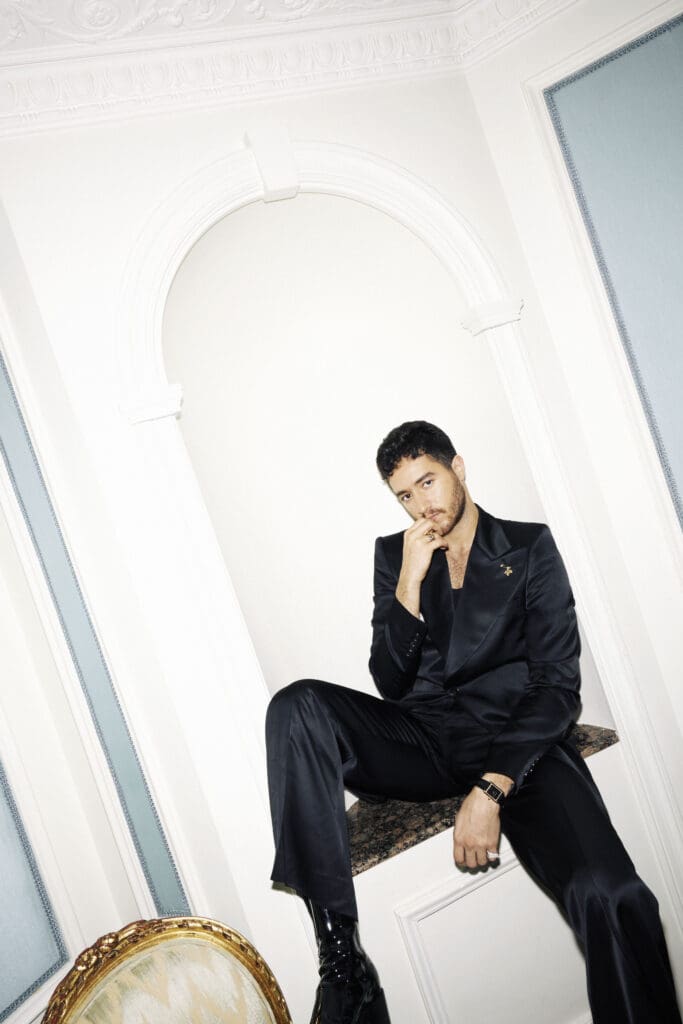
Photographer: Zoe McConnell
At 28, Malek has quickly become a household name in the Middle East with more than 30 acting credits to his ever-expanding resumé and chosen as an ambassador for Cartier and Dior – making him the first for his region.
The word influential seems a bit like an understatement for someone who has transcended the acronym MENA (Middle East and North African) and found himself on the global stage. It’s clear that he’s cultivated a fascination around himself, breaking the conventional mould and slowly navigating a career beyond Arabic cinema. But despite the outward glitz and glam of ambassadorship titles and millions of followers, Malek is still facing the realities of trying to break through stereotypes.
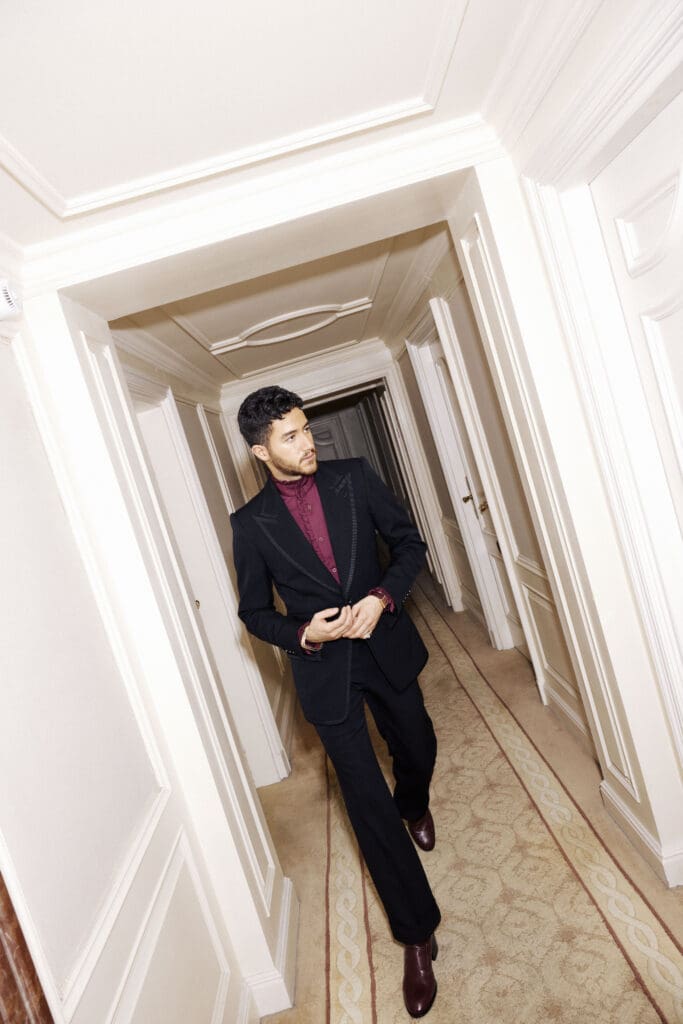
Photographer: Zoe McConnell
“I’m still discovering what it means as an Egyptian, as a Middle Eastern actor who’s fully Arab, to find my place in Western media,” he explains. “There’s an element of specificity that is tricky. Like, you always have to get certain roles, but how do you break away from that? There is also a general outlook of a certain place and that’s going to be based on how people perceive you, so it’s trying to break away from that as well.”
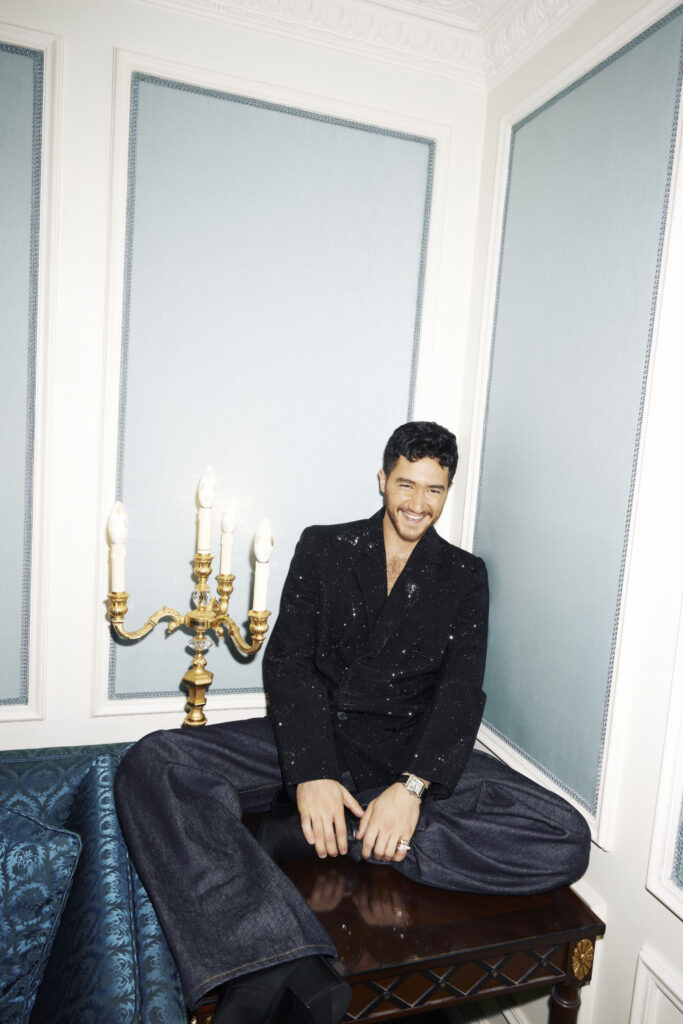
Photographer: Zoe McConnell
Typecasting is not a new topic in the film industry. Malek is aware of that. “It’s a given,” he states bluntly. Up until now, his projects that have reached Western screens and film festivals have seen him play a Syrian, an Afghan and an asylum seeker. Despite the clear pigeonhole that these have put him in, he is witnessing the undercurrent slowly changing.
“There are some casting directors and directors who are challenging this idea,” he says, referencing his latest role in the BBC’s Boiling Point series. “It was decided by Shaheen Baig [casting director] and Philip [Barantini, the director] to cast my role not based on a certain race or even sex, it was just a role. It was cast on who felt closer to the part. And it was a special thing for me as I didn’t get it because it was an Arab person, a refugee or a Muslim. This wasn’t a typical Arab role.”
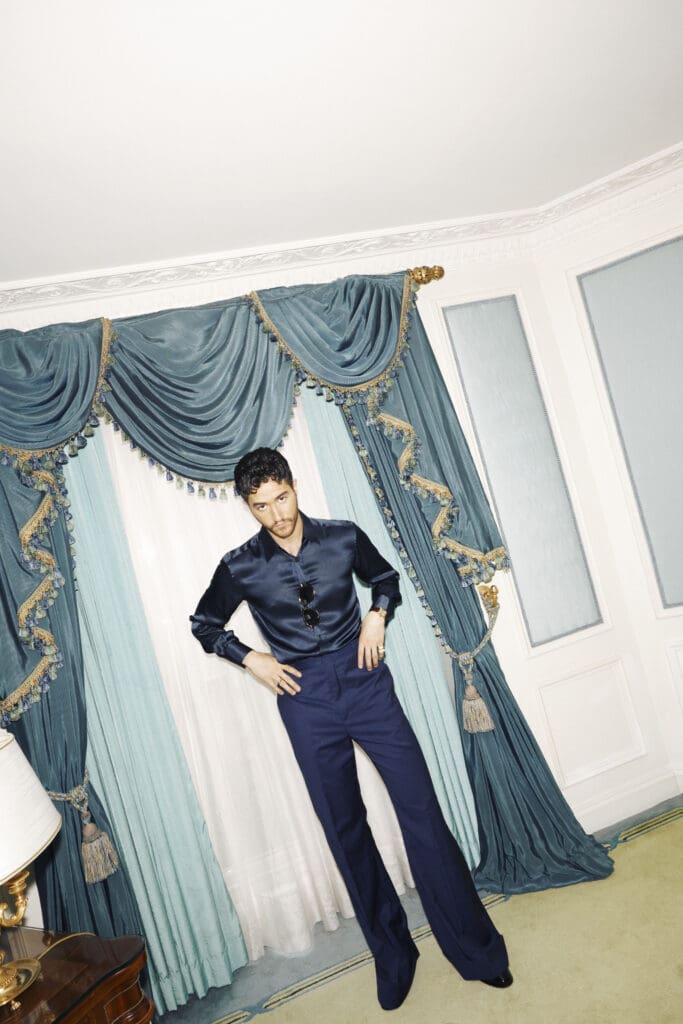
Photographer: Zoe McConnell
Based on the 2021 one-shot British film starring Stephen Graham, a head chef who is navigating a dinner service in a hostile kitchen, Malek’s role in the follow-up series sees him as the forgetful, cheeky waiter adamant for a chance to cook. Famed for his throw-away attitude to scripts, Barantini’s method allows actors room for improvisation.
“I had all these strict ideas of how things should be, and then I would step on set and realise I didn’t have to be so precious about what you thought it would be,” he replies when I ask how he adapted to this way of working. “I had to strip back to the very basic principles of acting, which is staying in the moment.”
For Malek, staying in the moment is all he has known for the past two decades. At the age of eight, he shot his first commercial and by 10 he had his first on-screen role. “I like to say to people around me that it chose me rather than me choosing it. It just happened by coincidence,” he says, tracing back through his childhood in Cairo. “I used to do puppet shows for my family as a child. My uncle saw it once and he knew this casting director, who then put me on board. It just kicked off from there. I began doing theatre as a kid and it slowly became a part of my identity.”
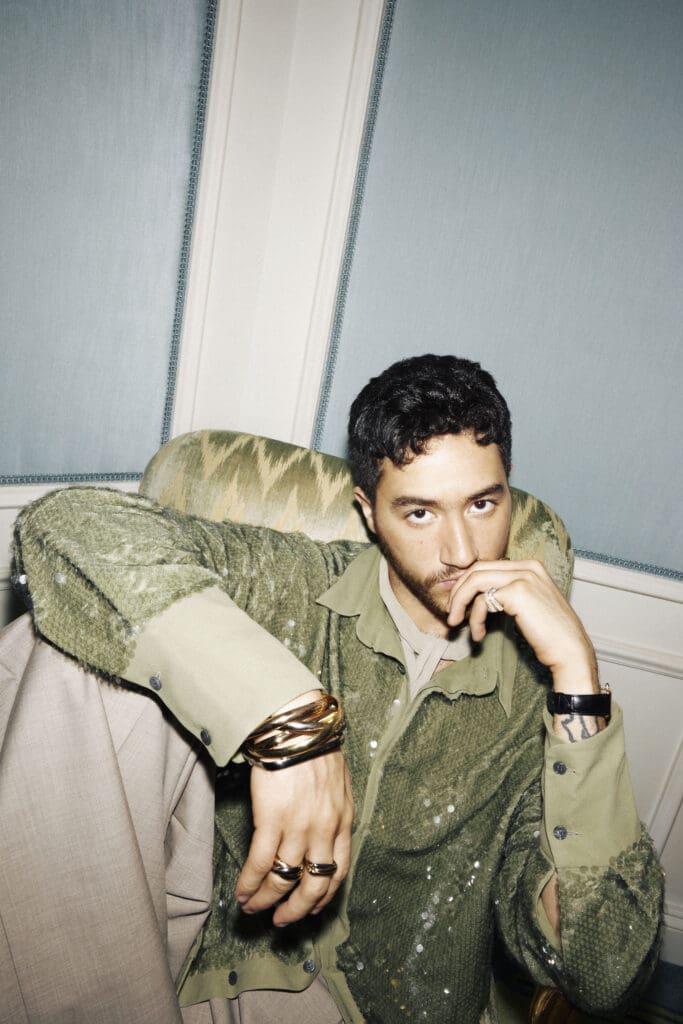
Photographer: Zoe McConnell
But it wasn’t until his teenage years that acting evolved from a hobby into a career. “During your late teenage years, you have all these existential questions about life and identity and then I realised who I was all along.” He adds, “I never finished school and decided to leave education –I didn’t even get my bachelor’s degree in the end. I felt there was always something missing. I felt some part of my youth was taken away.” From the outside, success was apparent but he was longing for character-shaping experiences and decided to take a year off to go to London’s RADA to hone his craft.
Ever since then, his credit list has been shaped by an eclectic mix of lauded Arabic films and independent English-speaking projects that weaponise the actor’s duality. But what’s most notable when looking at his Western projects is a diligent promise to himself to showcase the Middle East in a light often dismissed due to politics.
“I don’t want to victimise my region. But seeing what’s going on now, I also think our region is one of the most violent perceived places in the world. I grew up in endless wars,” he explains earnestly.
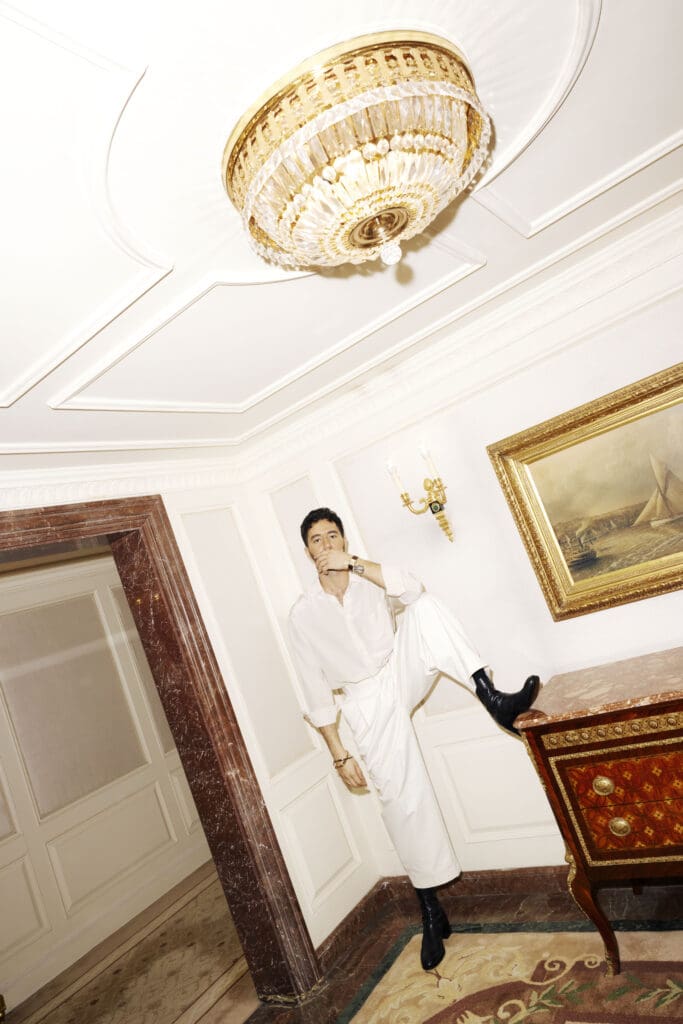
Photographer: Zoe McConnell
“I feel as an artist to be able to use my platform as much as possible to speak about humanity – to show the humanitarian side of my people – is crucial. I think what we really need is to humanise us because I feel we have really been dehumanised as a region. You hear of thousands of people dying and no one moves – it’s become normalised as it’s a part of everyday news. It breaks you. As an artist I want to tell more stories about my people and to humanise my people.”
It’s difficult to ignore the unrest that our interview is backdropped against, especially when speaking to Malek. He arrived at his cover shoot with the Palestinian keffiyeh dangling from his neck, while his Instagram stories showcase the horrors of what is happening in Gaza.
“As Middle Eastern artists, how do we share art and stories and laughter when you know what is happening around you? Even speaking out is not really welcomed, so you always feel oppressed but then feel blame for not speaking about it – there’s survivor’s guilt.”
There’s a layered complexity in our conversation as we manoeuvre through his career. His first critically acclaimed role was in Mohamed Diab’s Clash, which opened the Un Certain Regard section at Cannes in 2016 and was set amid the events of the Muslim Brotherhood government’s military overthrow in June 2013. Malek next appeared in Netflix’s The Swimmers, dramatising the true lives of two Syrian sister fleeing via the Aegean Sea and being smuggled across borders.
And most recently, he stars in Hassan Akkad’s self-reflective short, Matar, about the realities of asylum-seeking in the UK. His CV is littered with stories of displacement fuelled by his aforementioned wish to portray realities rather than fantasies.
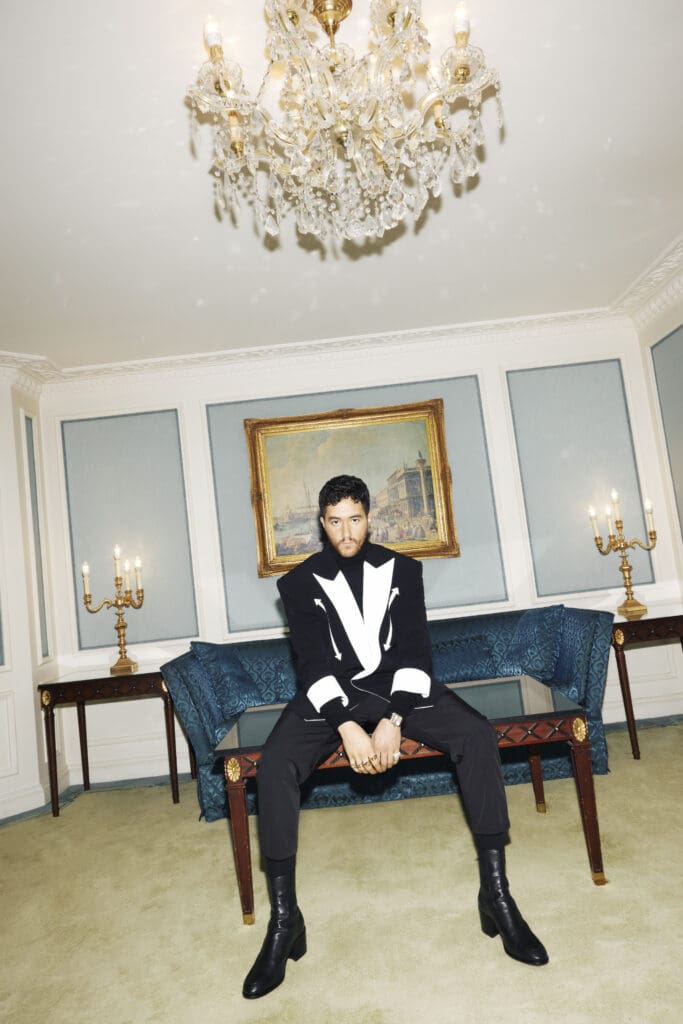
Photographer: Zoe McConnell
Matar was a project that came to him in its very earliest stages. While on set for The Swimmers, he met Akkad, who was an executive producer, alongside Ayman Alhussein, one of the lead consultants. “We shared the same language, we were around each other a lot, they were my community,” he explains.
“I heard Ayman was working on a script about his story, being a Deliveroo driver after arriving in the UK as a refugee on a boat. It was going to be Hassan’s first time as a director and they offered me the project on the day of the premiere for The Swimmers.”
Shortly afterwards, the script arrived in his hands and the trio developed the narrative further until it was ready to shoot in London over the span of a couple of days.
The result is a 20-minute film that confronts the harsh realities of Britain’s immigration system portrayed by the undocumented Matar [Malek] as he lives on the fringes of society, struggling to survive. Despite the film’s brevity, they were able to capture the isolation and discrimination fleeing migrants are faced with. It goes back to his wish to reframe the views people may have about the Middle East. He understands the impact he has, the platform he has garnered and the transformative power that film can have on audiences.
But just before we end our call, he leaves me with one final thought: “I think it’s our job as artists that, if you’re put in a position where people can hear you and you speak up about what you believe in and it doesn’t hurt anyone, you should try and make people’s life better.”
by Imogen Clark
Photographer: Zoe McConnell
Stylist: Luke Day
Groomer: Josh Knight using DIOR Backstage Foundation and DIOR Homme Dermo System
Digi: Nick Graham
Lighting assistant: Carissa Harrod
Styling assistant: Zac Sunman
Special thanks to The Bentley Hotel
Talent: Ahmed Malek
Look 1: Trinity XL ring in 18K white gold, 18K rose gold and 18K yellow gold, Grain de Café brooch in 18K yellow gold with diamonds, Tank Louis Cartier large model watch with mechanical movement in 18K yellow gold and black, lacquer dial and leather, Trinity ring in 18K white gold, 18K rose gold, 18K yellow gold and diamonds, all CARTIER, Suit, shoes BEN COBB x TIGER OF SWEDEN
Look 2: Trinity bracelet in 18K white gold, 18K rose gold and 18K yellow gold, Trinity ring in 18K white gold, 18K rose gold and 18K yellow gold with diamonds, Trinity ring in 18K white gold, 18K rose gold and 18K yellow gold, Tank Louis Cartier large model watch in 18K yellow gold with mechanical movement, sapphire cabochon and leather strap, all CARTIER, Suit EDWARD SEXTON, Shirt PALOMO SPAIN, Shoes BEN COBB X TIGER OF SWEDEN
Look 3: Trinity ring in 18K white gold, 18K rose gold and 18K yellow gold with diamonds, Trinity ring in 18K white gold, 18K rose gold and 18K yellow gold, Cartier Santos-Dumont watch in rose gold with extra-large hand-wound mechanical movement, steel and leather, all CARTIER, Jacket, jeans LOEWE, Shoes BEN COBB X TIGER OF SWEDEN
Look 4: Trinity ring in 18K white gold, 18K rose gold and 18K yellow gold, Trinity ring in 18K white gold, 18K rose gold and 18K yellow gold, Trinity ring in 18K white gold, 18K rose gold and 18K yellow gold with diamonds, Cartier Privé Tank Normale large model watch in yellow gold with hand-wound mechanical movement and leather, Première de Cartier sunglasses in Tortoiseshell composite, all CARTIER, Shirt STYLIST’S OWN, Trousers ACNE STUDIOS
Look 5: Trinity ring in 18K white gold, 18K rose gold and 18K yellow gold, Trinity XL ring in 18K white gold, 18K rose gold and 18K yellow gold, Trinity ring in 18K white gold, 18K rose gold and 18K yellow gold with diamonds, Trinity bracelet in 18K white gold, 18K rose gold and 18K yellow gold, Trinity XL bracelet in 18K white gold, 18K rose gold and 18K yellow gold, Cartier Santos-Dumont large model watch in 18K yellow gold with quartz movement and leather, all CARTIER, Shirt, scarf AMI, Trousers DIOR MEN
Look 6: Trinity bracelet in 18K white gold, 18K rose gold and 18K yellow gold, Trinity ring in 18K white gold, 18K rose gold and 18K yellow gold, Cartier Privé Tank Normale large model watch in yellow gold with hand-wound mechanical movement and leather, all CARTIER, Shirt LOOT, Trousers STUDIO NICHOLSON , Shoes BEN COBB X TIGER OF SWEDEN
Look 7: Trinity ring in 18K white gold, 18K rose gold and 18K yellow gold, Trinity ring in 18K white gold, 18K rose gold and 18K yellow gold, Trinity XL ring in 18K white gold, 18K rose gold and 18K yellow gold, Santos-Dumont watch in rose gold with extra-large hand-wound mechanical movement, steel and leather, Trinity ring in 18K white gold, 18K rose gold and 18K yellow gold with diamonds, all CARTIER, Jacket BALMAIN, Top JOHN SMEDLEY, Trousers MORO, Shoes BEN COBB x TIGER OF SWEDEN
